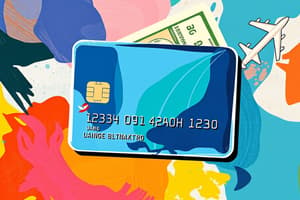Podcast
Questions and Answers
Luxury brands are not interested in investing in travel retail opportunities.
Luxury brands are not interested in investing in travel retail opportunities.
False (B)
The post-pandemic travel boom is not expected to impact the sales of the travel retail sector.
The post-pandemic travel boom is not expected to impact the sales of the travel retail sector.
False (B)
Travel retail is not considered a significant growth driver in the retail business.
Travel retail is not considered a significant growth driver in the retail business.
False (B)
Digitalization and interactive shopping experiences are not influencing luxury travel retail.
Digitalization and interactive shopping experiences are not influencing luxury travel retail.
Rome airport's strategy to focus on luxury offerings has not been successful.
Rome airport's strategy to focus on luxury offerings has not been successful.
Brands are not using digital screens and personalized services to enhance their luxury credentials in travel retail.
Brands are not using digital screens and personalized services to enhance their luxury credentials in travel retail.
Interactive displays and live demonstrations are not effective strategies for businesses in the travel retail market.
Interactive displays and live demonstrations are not effective strategies for businesses in the travel retail market.
Vacationers are less likely to make impulsive purchases when shopping at travel retail stores.
Vacationers are less likely to make impulsive purchases when shopping at travel retail stores.
The travel retail market is expected to reach $100 billion by 2025.
The travel retail market is expected to reach $100 billion by 2025.
Air travel requirements like security and passport control do not impact browsing and shopping time in travel retail stores.
Air travel requirements like security and passport control do not impact browsing and shopping time in travel retail stores.
Retailers in the travel retail market cannot negotiate with airport operators to secure better terms.
Retailers in the travel retail market cannot negotiate with airport operators to secure better terms.
E-commerce is not a key area of focus for businesses looking to succeed in the future of the travel retail industry.
E-commerce is not a key area of focus for businesses looking to succeed in the future of the travel retail industry.
Flashcards are hidden until you start studying
Study Notes
Travel Retail: The Boom of Luxury and Digital Experiences
Travel retail, often referred to as duty-free shopping, has been experiencing a surge in growth and transformation in recent years. With the post-pandemic travel boom, this sector is projected to surpass $117 billion in global sales by 2030, growing at nearly 10% annually from 2022. As airports expand their infrastructure to accommodate the rise in traffic, travel retail has become a key driver of growth in the retail business, combining luxury offerings with immersive experiences to elevate the overall airport experience.
Luxury Travel Retail
Luxury brands are increasingly investing in travel retail opportunities, particularly in airports. Rome airport, for example, has focused on luxury offerings to not only enhance the airport experience but also tap into a lucrative market. The strategy has been successful, with luxury retail driving growth in the retail business.
Digitalization and Experiences
Digital outlets and interactive shopping experiences are transforming luxury travel retail. Brands are reimagining brand activations to target affluent travelers, using digital screens and highly personalized services to reinforce their luxury credentials. For instance, Bulgari's Rome airport footprint features a new fragrance counter that offers a first-hand fragrance journey, complete with custom gift-wrapping and pop-up events like fragrance-flacon engraving.
Key Strategies for Travel Retail
To stand out in the competitive travel retail market, businesses should focus on creating an immersive, experiential shopping environment. Interactive displays, live demonstrations, and other engaging elements can help retailers appeal to vacationers looking for more than just products. Personalized and customizable products, showcasing local culture and craftsmanship, and leveraging the power of storytelling are also effective strategies.
The Psychology Behind Vacation Purchases
Understanding the unique needs and desires of travelers is essential for businesses looking to tap into the travel retail market. Vacationers are more open to indulging in impulsive purchases, seeking out unique items that serve as reminders of their trip, or simply looking for a convenient way to pass the time during a long layover.
The Travel Retail Market
The travel retail market is projected to reach over $126.48 billion by 2027, growing at an annual rate of 14-15% per year. The market encompasses a wide array of products and services, including luxury goods, beauty products, electronics, and irrespective gifts and souvenirs.
Challenges and Opportunities
Despite the lucrative nature of the travel retail market, it also presents challenges for retailers. Air travel requirements, such as security and passport control, can affect browsing and shopping time. Space constraints, baggage allowances, and product restrictions also impact the traveler's propensity to buy. However, retailers can negotiate with airport operators to secure favorable terms and cater to specific needs.
The Future of Travel Retail
As the travel retail industry continues to evolve, retailers must adapt to changing consumer preferences and trends. E-commerce, sustainability, innovation, and personalization are key areas of focus for businesses looking to succeed in this dynamic marketplace. By embracing these strategies, retailers can stay competitive and continue to meet the evolving needs of today's consumers.
Studying That Suits You
Use AI to generate personalized quizzes and flashcards to suit your learning preferences.



